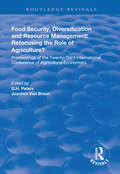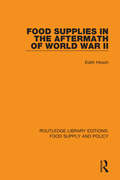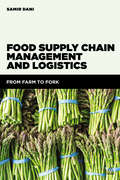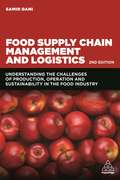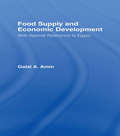- Table View
- List View
Food Security and Sustainability: Investment and Financing along Agro-Food Chains
by George Mergos and Marina PapanastassiouThis edited volume brings together contributions from experts on a range of food security issues, and examines them through a number of case studies. A Millennium Development goal and important policy concern, food security is experiencing renewed interest due to globalisation, which has led to population affluence, changing consumption, and production and trade patterns. The authors discuss how globalisation brings a new dimension to the discussion on public policy on food security, and consider the extent to which Global Value Chains (GVCs) dominate trade, investment and international agricultural markets. Food Security and Sustainability therefore sheds new light on the nexus of food security and globalization, as well as its implications for investment and financing in the agro-food sector. The volume draws on papers presented at the inaugural Workshop of the Mediterranean Center for Food Security and Sustainable Growth (MED-SEC), an international network of academics focusing on issues of development, sustainability and food security.
Food Security and The Church of Jesus Christ of Latter-day Saints
by Ray A. Goldberg Eliot ShermanThe Mormon Church focuses on self-reliance and being prepared for emergencies. Part of their program encourages each member of the Church to have a reserve food supply on hand at all times. Given U.S. and global food stock levels, is the Church program a good model for the country?
Food Security and the Modernisation Pathway in China: Towards Sustainable Agriculture (Critical Studies of the Asia-Pacific)
by Marie-Hélène SchwoobThis book aims at providing students, experts and practitioners with a detailed overview of agricultural and food security issues in China, analyzed through the lenses of a multidisciplinary approach that enables to fully grasp the current socio-political challenges and lock-ins of agricultural transformation towards more sustainable practices.Confronted to a running decrease and degradation of its resources and rapidly evolving food habits, China became a net importer of food in 2004, and its agricultural balance has since become heavier every day. Beyond providing a comprehensive overview of these stakes, this book also presents consistent and original first hand research material, collected by the author during months of fieldwork in China, in the countryside and from various economic and political circles. Conclusions drawn from this often difficult to access) fieldwork shed light on the whole galaxy of public and private stakeholders taking part in agricultural modernization in China, on their interests and on the patterns of power that underlie the development and implementation of agricultural policies.
Food Security in Asia
by Amitava MukherjeeAs one of the major challenges of the 21st century, food security requires nations to maintain food production at appropriate levels, provide potable water, and at once, ensure access of people to such food and water. Food suppliers also need to ensure year-long supply of food at optimum price and of high quality, both for needy and for discerning customers. Food Security in Asia provides a comprehensive analysis of the critical dimensions of food security in various countries of Asia. It compellingly argues that food insecurity is a complex phenomenon that requires a comprehensive response encompassing, inter alia, increasing food production, expanding economic and social access to food, special access to food for disadvantaged groups and, most importantly, breaking down the gender-based barriers to accessing food. The book discusses the major governmental policies in relation to the communities' responses. While highlighting the pressure exerted by climate change and world population growth, it also propounds ideas that would help in making informed policy choices.
Food Security in the Caribbean: Historical Perspectives, Current Challenges, and Sustainable Solutions (Palgrave Studies in Agricultural Economics and Food Policy)
by Donovan Stanberry Lystra Fletcher-PaulFood security is a pressing concern in the Caribbean. Caribbean countries produce and export crops including sugar, bananas, and coffee, but this archipelago of states relies heavily on imported food when it comes to nourishing the Caribbean population. As much as 80% of the food consumed is imported. This is because the region does not have a robust domestic food crop or livestock sector. Much of the imported food is processed: high in sugar, fat, and salt. As a result, the region now has one of the highest rates of obesity in the Americas. And there are, as a consequence, heightened incidences of non-communicable diseases such as diabetes and hypertension. This negatively impacts the resources and budgets of health facilities in the Caribbean, which in turn hurts the developmental prospects of these Small Island Developing States (SIDS). Food Security in the Caribbean breaks down the concept of food security in all of its dimensions and critically analyzes the state of food security within four specific pillars: availability, access, utilization, and stability. Offering insights into key trends in food production, consumption, and access, the book combines data from the CARICOM Secretariat, Ministries of Agriculture, and other relevant institutions. Chapters highlight the historical and structural conditioning of the Caribbean agriculture sector as an exporter of select tropical commodities and overreliance on imports for domestic food consumption. Chapters critically examine the fitness of purpose of regional and national institutional frameworks, investment in infrastructure, land reform, and the development of appropriate agricultural research, technology, and extension systems. There is an examination of the role of neoliberal policies and the directives of international funding institutions. The authors also address important and emerging challenges posed by COVID-19 and supply chain issues resulting from international conflicts, such as the one in Ukraine. This is an invaluable resource for economic researchers, policymakers, practitioners, and students interested in addressing the complex challenges of food security in the Caribbean region and beyond.
Food Security in the Economy of the Future: Transition from Digital Agriculture to Agriculture 4.0 Based on Deep Learning
by Elena G. Popkova Bruno S. SergiThis book explores issues of agricultural development and the provision of food security, providing a core framework and recommendations for implementing sustainable development goals in these areas. Focused on the period up to 2030 to match the timeline of the SDGs, the book surveys the current landscape and the prospects for agricultural development, demonstrating how Agriculture 4.0 based on AI and deep learning must follow from digitalization as the next step to ensuring food security. It brings together research based on analytical and statistical data, including the IMD World Digital Competitiveness Report and the Food Security Report from the Economist Intelligence Unit, and reliable mathematical tools including correlation and regression analysis, forecasting with histogramming, probability estimates, and the simplex method, as well as Game Theory methodology and the hierarchical procedure method of Thomas Lorie Saaty to forecast international scenarios for food security in the future economy. Containing theoretical and practical insights, the book will be of interest to those studying agricultural economics, the digital economy, and concepts of Agriculture 4.0 and Industry 4.0.
Food Security, Affordable Housing, and Poverty: An Islamic Finance Perspective (Palgrave Studies in Islamic Banking, Finance, and Economics)
by Ahmet Suayb GundogduThis book is the product of an attempt to look differently at the issue of poverty, along with food security and affordable housing. There is a tendency in conventional economics and finance literature to be apologetic when dealing with globally prevailing and unfair economic and financial systems. Islamic economics and finance academia is not immune from this tendency. The book aims to raise awareness about the root causes and suggests novel proposals that will lead to sustainable solutions. It is based on the understanding that if we continue doing more of the same things, we cannot expect to produce different results. This book is also premised on the understanding that the financial sector can promote economic progress only if it channels capital to the most productive use while avoiding moral hazard and adverse selection. The issue of collateral taking promotes a situation where financial institutions prefer to lend only too big-to-fail structures for shelter and food sectors that fuel poverty and inequality. This adverse selection ultimately gives rise to food security and affordable housing issues. This indicates that financial liberalization is not the solution to dealing with poverty and inequality. Instead, strong policy initiatives and financial regulations to direct capital to provide long-term sustainability are needed.
Food Security, Agricultural Policies and Economic Growth: Long-term Dynamics in the Past, Present and Future (Earthscan Food and Agriculture)
by Niek KoningUsing a political-economic approach supplemented with insights from human ecology, this volume analyzes the long-term dynamics of food security and economic growth. The book begins by discussing the nature of preindustrial food crises and the changes that have occurred since the 19th century with the ascent of technical science and the fossil fuel revolution. It explains how these changes improved living standards but that the realization of this improvement was usually dependent on government support for smallholder modernization. The author sets out how the evolution of food security in different regions has been influenced by farm policy choices and how these choices were shaped by local societal characteristics, international relations and changing configurations in metropolitan countries. Separate chapters are devoted to the interaction of this evolution with debates on food security and economic growth and with international economic policies. The final chapters highlight the new challenges for global food security that will arise as traditional sources of biomass production and the more easily extractable reserves of fossil biomass become depleted or can no longer be used. Overall, the book emphasizes the inadequacy of current explanations with regard to these challenges. It explores what is needed to ensure a sustainable future and calls for a rethinking of these issues; a necessary reflection in today's unstable global political situation.
Food Security, Diversification and Resource Management: Proceedings of the Twenty-Third International Conference of Agricultural Economists (Routledge Revivals)
by G.H. Peters Joachim von BraunPublished in 1999, the book is the proceedings volume of the 23rd International Conference of Agricultural Economists, held in Sacramento, California, in August 1997. It continues the series of triennial IAAE conferences.
Food Security, Food Prices and Climate Variability (Earthscan Food and Agriculture)
by Molly E. BrownThe agriculture system is under pressure to increase production every year as global population expands and more people move from a diet mostly made up of grains, to one with more meat, dairy and processed foods. This book uses a decade of primary research to examine how weather and climate, as measured by variations in the growing season using satellite remote sensing, has affected agricultural production, food prices and access to food in food-insecure regions of the world. The author reviews environmental, economics and multidisciplinary research to describe the connection between global environmental change, changing weather conditions and local staple food price variability. The context of the analysis is the humanitarian aid community, using the guidance of the USAID Famine Early Warning Systems Network and the United Nation’s World Food Program in their response to food security crises. These organizations have worked over the past three decades to provide baseline information on food production through satellite remote sensing data and agricultural yield models, as well as assessments of food access through a food price database. These datasets are used to describe the connection, and to demonstrate the importance of these metrics in overall outcomes in food-insecure communities.
Food Security, Nutrition and Sustainability
by Geoffrey Lawrence Kristen Lyons Tabatha WallingtonAs the threats of food insecurity loom ever larger, the world faces the sad irony of food shortages in the global South alongside a purported 'obesity epidemic' in the global North. The twin issues of food production and food access are of particular concern in the context of climate change, 'peak oil', biofuels, and land grabs by wealthy nations. Food Security, Nutrition and Sustainability offers critical insights by international scholars, with chapters on global food security, supermarket power, new technologies, and sustainability. The book also assesses the contributions of diet and nutrition research in building socially just and environmentally sustainable food systems and provides policy recommendations to improve the health and environmental status of contemporary agri-food systems. The book features contributions from a range of social science perspectives, including sociology, anthropology, public health and geography, with case study material drawn from throughout the world.
Food Security: From Excess to Enough (Point of View #9)
by Ralph C. MartinCanadians are failing to balance reasonable food consumption with sufficient and sustainable production. The modern agricultural system is producing more and more food. Too much food. The cost is enormous: excess nutrients are contaminating the air and water; soil is being depleted; species loss is plunging us toward the sixth extinction; and farmers, racking up debt, are increasingly vulnerable to economic and climatic shifts. At the same time, people are consuming too much food. Two-thirds of health-care costs in Canada can be attributed to chronic diseases associated with unhealthy eating. And then there is the waste — householders, food processors, distributors, wholesalers, and retailers collectively waste 40 percent of the food produced. A radical rethink is required. We need to move from excess to enough.
Food Supplies in the Aftermath of World War II (Routledge Library Editions: Food Supply and Policy)
by Edith HirschOriginally published in 1993. This study was written in 1946 having been commissioned by a large corporation in the food industry. The insights from this agricultural economics perspective even now are highly interesting. At the time there was real concern over food shortage and the UN and US government assumed there would be a problem for a long time to come. This study showed otherwise and set out suggestions for food policy and foreign aid policy with regards to food. This thorough study is an exemplary snapshot of the history of food policy and has lessons still to share.
Food Supply Chain Management and Logistics
by Samir DaniWith the growth of the food industry come unique logistics challenges, new supply routes, demand dynamics and investment re-shaping the future of the food logistics industry. It is therefore important for the food industry to innovate both with regards to demand management and sustainability of food sources for a growing population. Food Supply Chain Management and Logistics is an exciting new text that provides an accessible and essential guide to food supply chain management, considering the food supply chain from 'farm' to 'fork'. Samir Dani shows the reader how to stay ahead of the game by keeping abreast of global best practice, harnessing the very latest technology and squeezing efficiency and profit from increasingly complex supply chains. This book covers essential topics in food supply chain management, including: food supply chain production and manufacturing; food logistics; food regulation, safety and quality; food sourcing; food retailing; risk management; food innovation; technology trends; food sector and economic regeneration; challenges in International food supply chains; triple bottom line trends in the food sector; food security and future challenges.
Food Supply Chain Management and Logistics: Understanding the Challenges of Production, Operation and Sustainability in the Food Industry
by Samir DaniFirst edition WINNER: ACA-Bruel 2015 - Prix des AssociationsFood supply chains are integral in ensuring that food makes it from the farm to the table. Understanding how these operate has never been more important.The new edition of Food Supply Chain Management and Logistics is the guide to all aspects of food supply chains. This book examines food production, operational challenges and the future challenges of the industry and sustainability. The emergence of new technologies, which are key in increasing the efficiency of processes, such as food apps, big data and blockchain, are discussed. As are wider trends including veganism and local sourcing. Food Supply Chain Management and Logistics embeds learning using case studies from leading companies such as Cargill, Nestlé and Starbucks. In addition, case studies from sustainable businesses such as Omnom Chocolate and ReFood also feature. The book is structured to provide readers with an understanding of the basics of food supply chain management and logistics before expanding the scope to cover more of a range of topics. Online resources include PowerPoint lecture slides.
Food Supply Chain Management and Logistics: Understanding the Challenges of Production, Operation and Sustainability in the Food Industry
by Samir DaniFood supply chains are integral in ensuring that food makes it from the farm to the table. Understanding how these operate has never been more important.The new edition of Food Supply Chain Management and Logistics is the guide to all aspects of food supply chains. This book examines food production, operational challenges and the future challenges of the industry, sustainability and the circular economy. The emergence of new technologies, which are key in increasing the efficiency of processes, such as food apps, big data and blockchain, are discussed, with new content providing practical insights into supply chain resilience and risk mitigation.Food Supply Chain Management and Logistics embeds learning using case studies from leading companies such as Cargill, Nestlé and Starbucks. This new edition is structured to provide readers with an understanding of the basics of food supply chain management and logistics before expanding the scope to cover more of a range of topics. Online resources include PowerPoint lecture slides.
Food Supply Chain Management: Building a Sustainable Future
by Zhaohui Wu Madeleine PullmanThis fully updated new edition of a respected text retains the original’s comprehensive and practical approach to food supply chain management, and introduces a global perspective and a wide range of new material. More than ever, this is the food supply chain management textbook. With an introduction that speaks to academic and non-academic audiences alike, the second edition of Food Supply Chain Management covers all-new topics such as cold chain management, “last mile” logistics, blockchain and traceability in the food supply chain, and the implications of global trade and climate change. Case studies examine the farm-to-table movement, sustainable co-ops, and more, with “quick facts” and mini-cases that are engaging and thought-provoking. This textbook is appropriate for upper-level undergraduate and postgraduate students of agricultural business, natural resources, and food science, as well as supply chain management students. Supporting online materials include lecture slides, test banks, and instructor manuals.
Food Supply Chain Management: Economic, Social and Environmental Perspectives
by Zhaohui Wu Madeleine PullmanFood Supply Chain Management: Economic, Social and Environmental Perspectives is very different from parts supply chain management as can be seen from the increasing health, safety and environmental concerns that are increasingly garnering the public’s attention about different food supply chain problems. Food supply chain managers face very different environments. For example, there are very specific regulations from government bodies such as FDA or US Department of Agriculture, commodity subsidy programs, ever-changing trade policies, or increasing trends with intense public interest such as sustainability or bioengineering. While the popular press has written extensively about certain food supply chain issues, these books focus on health effects, specific supply chain practices (buy local vs. commodity supply chain), agricultural policy impacts, and problems in the modern food supply chain. Food Supply Chain Management covers the food supply chain comprehensively, and is appropriate for a business student audience and students in agriculture business, natural resources and food science.
Food Supply Chain Management: Issues For The Hospitality And Retail Sectors
by Stephen Ball Jane Eastham Liz SharplesThe key to the success of a company is their ability to co-ordinate the key supply chain i.e their key suppliers and suppliers of suppliers. 'Food and Drink Supply Chain Management' looks specifically at the supply chain in the food and drink industry to provide readers with an understanding of the areas as it is now and its growing importance, and where it is going in the future. 'Food and Drink Supply Chain Management' is the first to take an in-depth view into the supply chain function in the hospitality and food retail sectors. Authored by a range of expert contributors the text looks at issues such as:* New food processes and GM foods* Volume catering and JIT (Just In Time) and Food Safety* Relationships between companies and with stakeholders and responsibilities to these groups* The internationalisation of the food chain* The future of the food and drink supply chain and its managementExamples and case studies from large international retail and hospitality organizations are used, such as: Bass, Stakis (Hilton), and Tesco, amongst others, to illustrate good and bad practice.
Food Supply Chains in Cities: Modern Tools for Circularity and Sustainability
by Michael Bourlakis Emel AktasThis book analyses the food sector which has economic and political significance for all countries. A highly fragmented and heavily regulated sector, it has become increasingly complex owing to globalisation and geographical decoupling of production and consumption activities. The urban population of the world has grown from 746 million in 1950 to 3.9 billion in 2014 and more than 70% of the population is anticipated to be living in urban areas by 2050. Food supply chains play a vital role in feeding the world’s most populous cities, whilst underpinning transportation, storage, distribution, and waste management activities for the sustainability of the urban environment. That is why, this book presents the latest research on food supply chain management with a focus on urbanisation. The contributions involve food distribution in cities, food waste minimisation, and food security with a focus on models and approaches to achieve more sustainable and circular food supply chains.
Food Supply Networks: Trust and E-business
by Gert Jan Hofstede Rodney Bray Melanie Fritz Maurizio Canavari Nicola Cantore Oliver Meixner Aris Matopoulos Gerhard Schiefer Lisa House Rainer HaasWhen relations are facilitated by communication technologies such as e-business, food supply networks can improve efficiency, flexibility and effectiveness. However, a lack of trust within such transactions can prevent the integration of e-business into this large, economic sector. Using case studies from European countries, chapters discuss trust-building methods for food networks in an e-business environment. Key issues include the influence of cultural disparity and cross-border transactions upon major product groups such as meat, cereal products and fresh produce.
Food Supply Networks: Trust and E-business
by Gert Jan Hofstede Rodney Bray Nicola Cantore Oliver Meixner Aris Matopoulos Lisa House Rainer HaasWhen relations are facilitated by communication technologies such as e-business, food supply networks can improve efficiency, flexibility and effectiveness. However, a lack of trust within such transactions can prevent the integration of e-business into this large, economic sector. Using case studies from European countries, chapters discuss trust-building methods for food networks in an e-business environment. Key issues include the influence of cultural disparity and cross-border transactions upon major product groups such as meat, cereal products and fresh produce.
Food Supply and Economic Development: with Special Reference to Egypt
by Galal A. AminFirst Published in 1966. Routledge is an imprint of Taylor & Francis, an informa company.
Food System Sustainability
by Catherine Esnouf Marie Russel Nicolas Bricas Catherine Esnouf Marie RusselAs western-style food systems extend further around the world, food sustainability is becoming an increasingly important issue. Such systems are not sustainable in terms of their consumption of resources, their impact on ecosystems or their effect on health and social inequality. From 2009 to 2011, the duALIne project, led by INRA and CIRAD, assembled a team of experts to investigate food systems downstream of the farm, from the farm gate, to consumption and the disposal of waste. Representing a diverse range of backgrounds spanning academia and the public and private sectors, the project aimed to review the international literature and identify major gaps in our knowledge. This book brings together its key conclusions and insights, presenting state-of-the-art research in food sustainability and identifying priority areas for further study. It will provide a valuable resource for researchers, decision-makers and stakeholders in the food industry.
Food System Transparency: Law, Science and Policy of Food and Agriculture (Advances in Agroecology)
by Gabriela Steier Adam FriedlanderThis book brings together an international group of agriculture and food lawyers and scientists to define the field of Food System Transparency in three parts: the big picture, food safety and health, and the global view. Each part adds to the whole but zooms in through a unique lens. Investigating social, economic, political, scientific and legal frameworks, this comprehensive volume addresses topics such as food authenticity, agroecological evaluations, and consumer protection. Interwoven themes of transparency contextualize concepts of food safety, information sharing and regulatory opportunities at a local and global scale. Editors’ notes provide blended legal and scientific commentary to facilitate further discussion and context within the classroom. Advantages of this volume include: Chapters written by foremost international experts in their fields Editors’ notes written for classroom use and background information Figures and tables providing illustrations of important concepts Case studies delivering practicality and in-depth analysis to current events A special chapter on COVID-19 and its implications for the food system This book is important reading for graduate-level students, legal scholars, nonlegal academics, advocates for food system transparency and resilience, agroecology and environmental conservation, and practitioners in any cross-disciplinary areas relating to food policy. It will be of interest to all those who seek to deepen their understanding of the concepts and trends surrounding the information that centers around our food system, both domestically in the United States and the European Union, as well as in many major trading nations such as China.Check out the Support Materials tab on www.routledge.com/9780367440367 for a short video previewing some the key themes in the book.







